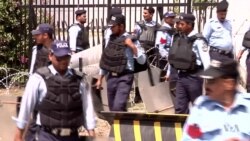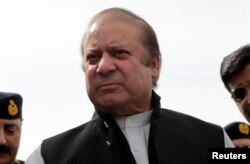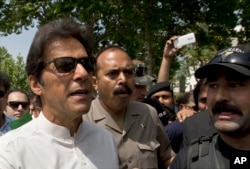Pakistan’s Supreme Court Thursday ordered the formation of a joint investigation team to examine allegations of corruption against the country’s prime minister and his sons.
The decision by a five-member bench, headed by the country’s chief justice, also ordered Prime Minister Nawaz Sharif and his sons Hassan, and Hussein Nawaz to appear before the investigation team.
The court ordered the team to present its report to the apex court every two weeks and finish its investigation in two months.
The much-awaited decision came almost two months after the court finished hearing hundreds of hours of arguments by the two sides and reserved its judgment in February.
The petition against Prime Minister Nawaz Sharif and his children, filed by his main opponent Imran Khan and others, had requested the court disqualify him for corruption, tax evasion, and money laundering. Sharif denied any wrongdoing and his supporters alleged that Khan was trying to derail their government.
Both sides hailed the court’s decision as a victory for them, with Sharif’s party saying the court has rejected the evidence presented before it and Khan’s party saying the court has shown that Sharif had been unable to show a clean money trail.
The months-long media frenzy surrounding the case reached a fevered pitch Wednesday when the court indicated it would announce the decision Thursday.
Almost all of Pakistan’s news channels started running non-stop special programming examining every angle of the case and speculating about the decision.
Meanwhile, the capital’s police prepared for the decision by deploying hundreds of personnel around the Supreme Court and surrounding area and blocking access to the red zone, which included major government buildings and foreign embassies.
Police also reached out to the local leaders of political parties and asked for their help in keeping their workers calm after the decision. Both Sharif and Khan told their workers to stay away from the court. Those who wanted to attend the Supreme Court hearing needed special passes from the police.
Major political parties called meetings of their senior leadership to chart a way forward on the basis of the decision.
Investigative journalists' report
The controversy erupted in April last year soon after the International Consortium of Investigative Journalists published their Pulitzer prize winning investigation of a global financial industry that helped political leaders, businessmen, criminals, and others around the globe hide their ill gotten gains or provide tax havens through offshore companies.
The names of Prime Minister Sharif’s children appeared in the leaked documents linked to offshore accounts and the purchase of four luxury flats in Central London.
While the prime minister himself was not named in the documents, he faced questions about where the money came from, whether it was laundered, and why weren’t the flats declared.
His chief opponent Khan, who had always accused Sharif of large scale corruption, touted the papers as proof that Sharif and his family were looting the country. Khan said the prime minster has lost his moral authority and should resign.
While Sharif’s two sons are outside the country and run their own businesses, his daughter lives with him. She is also considered his political successor. The opposition was trying to prove that she was her father’s financial dependent and whatever she owned came from him.
While the court heard arguments in the case, both sides tried to fight a simultaneous media trial with daily press conferences and appearances in television talk shows.








